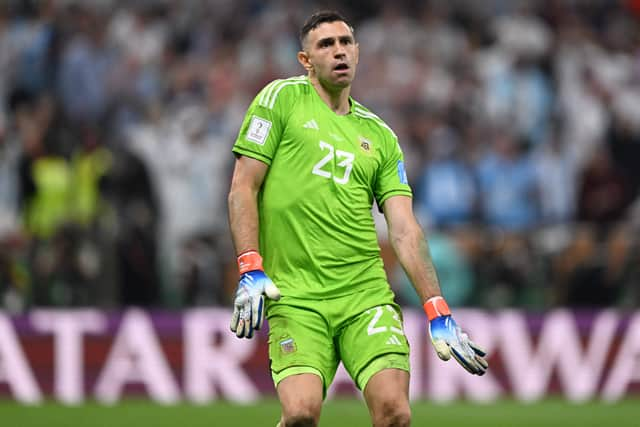IFAB’s penalty kick rule changes are unnecessary and will strip yet more character out of football
and live on Freeview channel 276
The year is 2032. The International Football Association Board’s new regulations state that before all penalty kicks are taken, goalkeepers must first don their customary vacuum-sealed straitjacket, barbed wire blindfold, and lead-lined clown shoes. Upon the sounding of the referee’s whistle, the taker may fire a maximum of three shots from a high-powered beanbag cannon directly at the goalkeeper’s abdomen. Any movement from the goalkeeper after they have assumed their initial position on the goal-line, including during the firing of the beanbag cannon, will be punishable by a round of live sniper fire from a crack team of elite Navy SEAL veterans, positioned in crow’s nests next to the cameras that monitor the Goal Decision System. In the event of the kicker missing their penalty, they will be allowed a maximum of five do-overs, regardless of if the goalkeeper has been wounded or not.
You can roll your eyes, laugh it up, tell me to sod off if you really must, but this is the puerile future that we are headed towards if common sense does not prevail. Over the weekend, IFAB, those meddling pencil-pushers with their obsessive lust for perfunctory innovation, announced a whole series of changes to the rules surrounding penalty kicks.
Advertisement
Hide AdAdvertisement
Hide AdTo quote them entirely verbatim: “Clarification that the goalkeeper must not behave in a manner that fails to show respect for the game and the opponent, i.e. by unfairly distracting the kicker. The defending goalkeeper must remain on the goal line, facing the kicker, between the goalposts, without touching the goalposts, crossbar or goal net, until the ball is kicked. The goalkeeper must not behave in a way that unfairly distracts the kicker, e.g. delay the taking of the kick or touch the goalposts, crossbar or goal net.”
In short, from July 1st, when these new regulations are officially introduced, a scenario that is already heavily weighted towards the attacking player will be even more so. Wonderful.


The discourse around goalkeeping antics and penalty kicks has been ignited fervently in the wake of Emi Martinez’s popping, locking, striker-mocking performance in the World Cup final last December. The Argentine, mustering every ounce of skullduggery in his ample frame, cavorted, convulsed, and conversed his way through a shootout against France to carve his name into the vast marble obelisk of footballing history forevermore. Sporting, it was not, but nor was it evil personified, despite the protestations of some. More importantly still, it was characterful, camply dramatic, and to the neutral, at least, fun.
Already penalties overwhelming favour the taker. Twelve yards is not a very large distance to have something pelted at you from, especially when the person doing the pelting is paid obscene amounts of money primarily for their ability to pelt things at exceedingly fast speeds.
Advertisement
Hide AdAdvertisement
Hide AdThe fact that goalkeepers are already required to remain on their line right up until the point at which the ball is struck also makes things exceptionally difficult - although that, in and of itself, is an understandable rule. The alternative is that we have keepers rushing the spot like fitted bedsheets in blustering gales blowing free of rotary washing lines. Rewatch footage of Jerzy Dudek in the 2005 Champions League final and try claiming, with a straight face, that the current restrictions aren’t a logical improvement.
But IFAB are starting to go mad with power. (You ever tried going mad without power? It’s boring. No one listens to you!) This latest batch of half-baked alterations do little but entrench goalkeepers’ status as coconuts in a shy. One of the only opportunities for advantage that a shotstopper has in football’s great duelling lottery is the power to unsettle and unnerve. Nobody’s advocating for outright abuse, but by enshrining a ban on something as subjective as disrespectful behaviour, those at the top are essentially swaddling kick-takers in bubblewrap. If a player can’t handle the pressure of a little bit of needling and some eyeball to eyeball before they embark on their run-up, perhaps they shouldn’t be taking a penalty in the first place.
And again, we’re faced with a situation in which a stiff-collared rabble of vampiric bureaucrats are threatening to strip yet another strand of personality out of the game. Football is nothing without confrontation. Of course, there must be boundaries, but sanitising it to a point of polite indifference benefits nobody, and least of all the spectator. And where exactly is the line in all of this? Does it stop with goalkeepers and penalty kicks, or do we keep diluting football until sighing too loudly within earshot of an opponent requires a write-up in the referee’s post-match report? Stop the nonsense, let the mind games unfurl themselves, and allow the weak crumble.
Oh, and if IFAB really must have their annual tinker with the very fabric of the game, why not do something materially useful, like making any kind of tampering with the penalty spot a bookable offence? Like draught-excluders behind defensive walls and insincere Notes app apologies, it is becoming an increasing trend in the very upper echelons of the sport, and unlike the odd verbal interaction between goalkeeper and kick-taker, it does actually need to be, somewhat ironically, stamped down on. Rant over.
